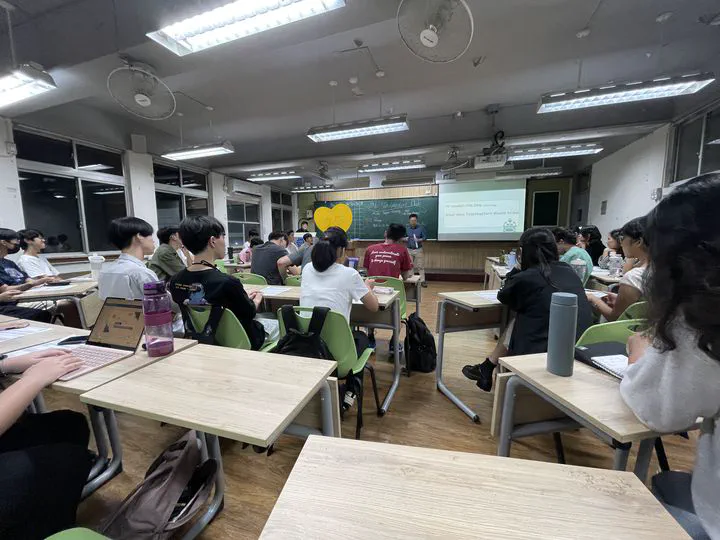Toastmasters 示範例會心得:從結構、回饋到自信的全新理解
 Image credit: Photo by Ying-Chu Chen
Image credit: Photo by Ying-Chu Chen
參加 Toastmasters 示範例會 對我而言既是一種謙卑的體驗,也是一次自我賦能的過程。加入之前,我以為自己已具備相當穩固的公開演講能力——畢竟我時常講課、發表研究、並參與專業討論。然而,站上 Toastmasters 的舞台後,我才意識到:真正的表達藝術不僅是內容的精緻呈現,更是氣場、節奏與連結的融合。
我最深刻的體會之一是「結構」的重要性。與以數據與證據為核心的學術報告不同,Toastmasters 的演講更依賴敘事的清晰度。觀眾不只是吸收資訊,他們更被故事、比喻與情感共鳴所觸動。學會將專業或技術性的主題置於引人入勝的框架之中,迫使我重新思考如何傳達訊息——不僅是為了說服,更是邀請聽眾共同展開一段旅程。
另一個改變性的收穫來自於「回饋」。在每次演講之後,能立即得到具體、建設性且鼓勵性的評價是相當罕見的。這些評語讓我更加留意那些容易被忽視的小習慣:例如在轉折時無意間出現的贅詞、不自覺地來回踱步,或是在關鍵段落中急於趕進度。這樣的回饋循環不僅提升了我的自覺性,更重要的是,它讓「錯誤」不再等同於「失敗」,而是邁向進步的墊腳石。這種持續改善的文化,正是 Toastmasters 最強大的力量之一。
同樣值得注意的是 Toastmasters 對「領導力」的重視。許多人以為這只是個訓練演講的場合,但實際上它同時培養組織與人際互動的能力。主持會議、協調角色、或支持其他會員,都需要靈活性與同理心。在這些時刻,溝通不再是一場「表演」,而是一種「服務」——幫助他人發揮所長。
對我而言,最大的轉變或許是「自信」的重新定義。它不再是外顯的張揚,而是一種沉著的篤定。當緊張感不可避免地湧上時,我學會將它視為能量,並引導其轉化為專注的存在感。停頓前的寧靜、關鍵語句的留白,甚至是一個眼神的交流,都可能比再精緻的詞藻更具力量。從這個角度來看,Toastmasters 的真諦不是掌握語言,而是掌握自我,並與他人建立真實的連結。
回顧這段歷程,我發現自己所培養的能力已遠遠超越會議室。無論是在教學、談判,或是日常對話中,清晰、真誠與回應性的原則,都持續塑造我與他人互動的方式。Toastmasters 讓我體悟到,溝通不僅是一門技巧,而是一種終身的修煉——融合理性與同理心,結合表達與存在感。
Participating in Toastmasters has been both a humbling and empowering experience. Before joining, I thought I had a relatively solid command of public speaking—after all, I lecture, present research, and engage in professional discussions regularly. Yet standing on the Toastmasters stage revealed something different: the subtle art of presence, pacing, and connection goes far beyond delivering polished content.
One of the most striking lessons I have gained is the value of structure. Unlike academic presentations, where data and evidence dominate, a Toastmasters speech thrives on clarity of narrative. Audiences do not merely absorb information; they respond to stories, analogies, and emotional resonance. Learning to frame even technical topics within a compelling arc has forced me to rethink how I communicate—not only to persuade, but also to invite the audience into a shared journey.
Another transformative aspect has been the practice of feedback. It is rare to receive immediate, constructive, and encouraging critiques after every performance. The evaluations have sharpened my awareness of habits I would otherwise overlook: filler words creeping into transitions, the unconscious pacing back and forth, or the tendency to rush through climactic points. This feedback loop cultivates self-awareness, but more importantly, it normalizes growth. Mistakes are not failures but steppingstones, and this culture of continuous improvement is one of the most powerful dimensions of Toastmasters.
What also stands out is the emphasis on leadership. Many assume Toastmasters is solely about speaking, yet the program equally fosters organizational and interpersonal skills. Chairing a meeting, coordinating roles, or supporting fellow members demands adaptability and empathy. In these moments, communication is not a performance but a service—an act of enabling others to succeed.
Perhaps the greatest personal shift for me has been confidence not as bravado, but as calm assurance. When nerves inevitably surface, I now see them less as obstacles and more as energy to be redirected into presence. The silence before a key statement, the deliberate pause, or even eye contact across the room can carry more weight than the most elaborate phrasing. In this sense, Toastmasters is not about mastering words but about mastering oneself in relation to others.
In reflection, I realize that the skills I have honed here extend far beyond the meeting room. Whether I am teaching, negotiating, or even engaging in casual conversation, the principles of clarity, authenticity, and responsiveness shape the way I connect with others. Toastmasters has shown me that communication is not merely a technical skill but a lifelong discipline, one that blends intellect with empathy and performance with presence.
National Taiwan Normal University
No. 162, Section 1, Heping East Road, Taipei City, Da’an Dist. 106